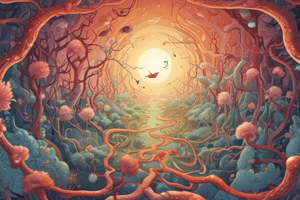Podcast
Questions and Answers
What is the primary focus of the field of ecology?
What is the primary focus of the field of ecology?
- The study of heredity and genetic variation
- The interactions between organisms and their environment (correct)
- The structure and function of biological molecules
- The study of microorganisms
Which branch of biology is concerned with the study of plants and their interactions with the environment?
Which branch of biology is concerned with the study of plants and their interactions with the environment?
- Botany (correct)
- Zoology
- Microbiology
- Ecology
What is the main function of carbohydrates in the body?
What is the main function of carbohydrates in the body?
- To perform a wide range of functions in the body
- To provide structure for the body
- To provide energy for the body (correct)
- To contain the genetic information necessary for life
Which biological molecule is responsible for containing the genetic information necessary for life?
Which biological molecule is responsible for containing the genetic information necessary for life?
What is the primary focus of the field of biochemistry?
What is the primary focus of the field of biochemistry?
Which branch of biology is concerned with the study of the structure and function of biological molecules?
Which branch of biology is concerned with the study of the structure and function of biological molecules?
What is the primary function of the plasma membrane in a cell?
What is the primary function of the plasma membrane in a cell?
Where does protein synthesis occur in a cell?
Where does protein synthesis occur in a cell?
What is the process by which cells generate energy from glucose?
What is the process by which cells generate energy from glucose?
What is the process of cell division that results in four daughter cells with half the number of chromosomes as the parent cell?
What is the process of cell division that results in four daughter cells with half the number of chromosomes as the parent cell?
What contains the cell's genetic material?
What contains the cell's genetic material?
Flashcards are hidden until you start studying
Study Notes
What is Biology?
Biology is the scientific study of life and living organisms, including their structure, function, growth, evolution, distribution, and taxonomy.
Branches of Biology
• Botany: study of plants and their interactions with the environment • Zoology: study of animals and their interactions with the environment • Microbiology: study of microorganisms such as bacteria, viruses, and fungi • Ecology: study of the interactions between organisms and their environment • Genetics: study of heredity, genes, and genetic variation • Biochemistry: study of the chemical processes that occur within living organisms • Molecular Biology: study of the structure and function of biological molecules such as DNA and proteins • Cell Biology: study of the structure and function of cells, the basic units of life
Biological Molecules
• Carbohydrates: provide energy for the body (e.g. sugars, starches, fibers) • Proteins: perform a wide range of functions in the body (e.g. enzymes, hormones, structural proteins) • Lipids: provide energy and structure for the body (e.g. fats, oils, cholesterol) • Nucleic Acids: contain the genetic information necessary for life (e.g. DNA, RNA)
Cell Structure
• Plasma Membrane: separates the cell from its environment and regulates what enters and leaves the cell • Cytoplasm: jelly-like substance inside the cell where metabolic processes take place • Nucleus: contains the cell's genetic material (DNA) • Mitochondria: generate energy for the cell through cellular respiration • Endoplasmic Reticulum: involved in protein synthesis and transport • Ribosomes: site of protein synthesis
Biological Processes
• Photosynthesis: process by which plants and some other organisms convert light energy into chemical energy • Cellular Respiration: process by which cells generate energy from glucose • Mitosis: process of cell division that results in two daughter cells with the same number of chromosomes as the parent cell • Meiosis: process of cell division that results in four daughter cells with half the number of chromosomes as the parent cell (occurs in gamete formation)
What is Biology?
- Biology is the scientific study of life and living organisms, including their structure, function, growth, evolution, distribution, and taxonomy.
Branches of Biology
- Botany studies plants and their interactions with the environment.
- Zoology studies animals and their interactions with the environment.
- Microbiology studies microorganisms such as bacteria, viruses, and fungi.
- Ecology studies the interactions between organisms and their environment.
- Genetics studies heredity, genes, and genetic variation.
- Biochemistry studies the chemical processes that occur within living organisms.
- Molecular Biology studies the structure and function of biological molecules such as DNA and proteins.
- Cell Biology studies the structure and function of cells, the basic units of life.
Biological Molecules
- Carbohydrates provide energy for the body, including sugars, starches, and fibers.
- Proteins perform a wide range of functions in the body, including enzymes, hormones, and structural proteins.
- Lipids provide energy and structure for the body, including fats, oils, and cholesterol.
- Nucleic Acids contain the genetic information necessary for life, including DNA and RNA.
Cell Structure
- The Plasma Membrane separates the cell from its environment and regulates what enters and leaves the cell.
- Cytoplasm is a jelly-like substance inside the cell where metabolic processes take place.
- The Nucleus contains the cell's genetic material (DNA).
- Mitochondria generate energy for the cell through cellular respiration.
- The Endoplasmic Reticulum is involved in protein synthesis and transport.
- Ribosomes are the site of protein synthesis.
Biological Processes
- Photosynthesis is the process by which plants and some other organisms convert light energy into chemical energy.
- Cellular Respiration is the process by which cells generate energy from glucose.
- Mitosis is the process of cell division that results in two daughter cells with the same number of chromosomes as the parent cell.
- Meiosis is the process of cell division that results in four daughter cells with half the number of chromosomes as the parent cell, occurring in gamete formation.
Studying That Suits You
Use AI to generate personalized quizzes and flashcards to suit your learning preferences.




